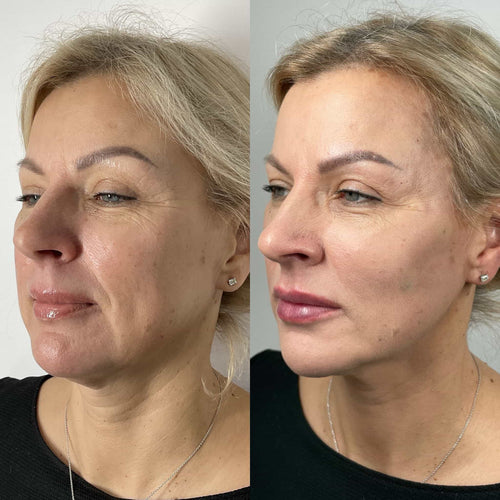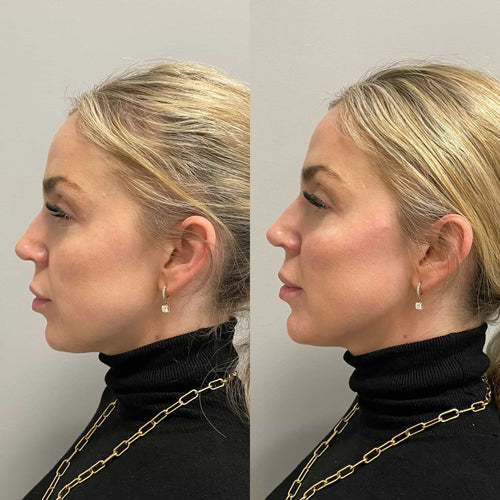Reserve a Dermal Filler Consultation with Dr. Laura Geige
Factors to Consider
Medical History
When considering lip fillers, several factors play a crucial role in determining the potential for complications and the overall success of the procedure.
Medical history stands as a particularly significant factor. Certain pre-existing conditions or medications can increase the risk of adverse reactions to fillers.
Individuals with a history of allergies, especially to local anesthetics or hyaluronic acid (a common filler ingredient), should exercise extreme caution. Allergies can manifest as swelling, itching, redness, and even anaphylactic shock in severe cases.
Blood clotting disorders or conditions like hemophilia increase the risk of bleeding and bruising during and after the procedure.

Patients on blood thinners must consult their doctor before undergoing lip fillers as these medications can interfere with clotting and prolong bleeding.
Autoimmune diseases, such as lupus or rheumatoid arthritis, may also present a challenge, as they can affect the body’s immune response to foreign substances like fillers.
It’s crucial for individuals with any medical conditions to thoroughly discuss their health history with a qualified and experienced injector.
They will assess the risks and benefits and determine if lip fillers are a suitable option, potentially suggesting alternative treatments or modifications to the procedure.
Open communication and honesty regarding medical history are paramount to ensuring a safe and successful outcome.
Sun Exposure and Tanning

When considering lip fillers, sun exposure and tanning are important factors to be mindful of.
Excessive sun exposure can break down collagen and elastin, the proteins that give skin its structure and elasticity. This breakdown can make lips appear thinner and more wrinkled over time, potentially diminishing the effects of lip fillers.
Tanning, whether through natural sun exposure or tanning beds, also damages the skin’s DNA, leading to premature aging and increasing the risk of skin cancer.
After receiving lip fillers, it is crucial to protect your lips from the sun by wearing a broad-spectrum sunscreen with an SPF of 30 or higher daily.
This will help maintain the volume and shape of your lips, as well as protect your overall skin health.
Additionally, it’s best to avoid excessive tanning, both indoors and outdoors, in the weeks following a lip filler procedure to minimize any potential risks or complications.
Current Medications
Determining the “worst” day for lip fillers is subjective and depends on individual factors. However, certain days may present higher risks or challenges compared to others.
Here are some factors to consider:
-
Upcoming Events:** Avoid getting lip fillers if you have a significant event planned soon, such as a wedding, job interview, or important meeting. Swelling and bruising are common side effects, which may take several days to subside.
-
Sun Exposure:** Excessive sun exposure can worsen inflammation and increase the risk of complications. Schedule your appointment for a time when you can avoid direct sunlight for at least a few days following the procedure.
-
Menstrual Cycle: Some individuals experience increased sensitivity during their menstrual cycle. If you are prone to swelling or bruising, it’s best to avoid lip fillers during this time.
-
Medications:** Certain medications, such as blood thinners and aspirin, can increase the risk of bleeding and bruising. Consult with your doctor about any potential interactions before undergoing the procedure.
-
Allergies: Be sure to inform your practitioner of any allergies you have, including allergies to lidocaine or other anesthetic agents used during lip fillers.
Current Medications:
It is crucial to disclose all medications you are currently taking to your doctor or the injector performing the lip filler procedure. Some common medications that may influence the treatment include:
-
Blood Thinners: Aspirin, warfarin (Coumadin), and clopidogrel (Plavix) can increase the risk of bleeding.
-
Anti-inflammatory Drugs (NSAIDs): Ibuprofen (Advil, Motrin) and naproxen (Aleve) can also thin the blood.
-
Retinoids: These medications used for acne or skin aging may increase sensitivity and make it more difficult for the filler to adhere properly.
-
Herbs and Supplements: Some herbal supplements, such as ginkgo biloba and garlic, can have blood-thinning effects.
It is important to note that this list is not exhaustive. Always consult with your doctor or the injector to determine if any of your medications may interact with lip fillers.
Potential Complications
Infection
Infection is a serious potential complication of any cosmetic procedure, including lip fillers.
Several factors can increase the risk of infection following lip filler injections:
- Not using sterile equipment and techniques:
- Using non-licensed practitioners:
- Underlying skin conditions:
- Compromised immune system:
- Touching the injection site after treatment:
Improper sterilization of needles, syringes, or the injection site can introduce bacteria into the body.
Unqualified individuals may not adhere to proper hygiene protocols or have the necessary training to minimize infection risk.
Existing skin infections, acne, or eczema can make the area more susceptible to complications.
Individuals with weakened immune systems are at a higher risk of developing infections.
Introducing bacteria through contaminated hands can increase infection risk.
Symptoms of lip filler infection can include:
- Redness and swelling around the injected area that worsens over time.
- Pain, tenderness, or warmth at the injection site.
- Pus or drainage from the injection site.
- Fever.
It is crucial to seek immediate medical attention if you experience any of these symptoms after lip filler injections.
Prompt treatment can help prevent the infection from spreading and causing further complications.
Allergic Reactions
Potential complications from lip fillers, like any medical procedure, are relatively uncommon but can occur.
It’s essential to understand these risks before undergoing treatment and to discuss them with a qualified and experienced practitioner.
Here are some potential complications:
- Infection: Any injection carries a risk of infection. Proper sterilization techniques and hygiene practices minimize this risk.
- Bleeding and Bruising: These are common side effects, usually mild and resolving within a few days.
- Lumps and Nodules: Filler material may clump together, creating lumps or nodules. They often resolve on their own or can be dissolved with an enzyme.
- Asymmetry: Achieving perfect symmetry can be challenging. Slight asymmetry might occur, but a skilled injector minimizes this risk.
- Vascular Occlusion: This serious complication involves filler blocking blood vessels. It’s rare but requires immediate medical attention.
Schedule a Dermal Filler Appointment with Dr. Laura Geige Now
Allergic Reactions:
Although rare, some individuals may be allergic to the ingredients in fillers.
Symptoms can range from mild (redness, itching) to severe (anaphylaxis). It’s crucial to inform your injector of any allergies before treatment.
A patch test might be recommended for patients with known allergies to confirm compatibility.
Bruising and Swelling
Bruising and swelling are common side effects after lip filler injections, typically peaking within 24-48 hours and resolving within a week. However, certain factors can increase the likelihood and severity of these complications.
Potential Complications associated with lip fillers include:
• *Infection*: This is rare but can occur if sterile techniques are not followed during the injection procedure. Signs of infection include redness, swelling, pain, warmth, or discharge from the injection site.
• *Allergic reaction*: While uncommon, some individuals may be allergic to the hyaluronic acid filler material. Symptoms can range from mild (redness, itching) to severe (hives, swelling of the face, difficulty breathing).
• *Lumpiness or asymmetry*: Uneven injection or the body’s natural response to the filler can result in lumps or an asymmetrical appearance.
• *Vascular occlusion*: This is a serious complication where the filler blocks blood flow to tissues, potentially leading to tissue death. It is rare but requires immediate medical attention.
Certain factors can increase the risk of bruising and swelling after lip fillers:
• *Blood thinners*: Medications like aspirin or warfarin can increase bleeding. Discontinue these medications as directed by your doctor before the procedure.
• *Smoking*: Nicotine constricts blood vessels, increasing the risk of bruising.
• *Skin sensitivity*: Some individuals are more prone to bruising and swelling than others.
• *Facial anatomy*: The location and structure of your facial muscles can affect the extent of bruising and swelling.
To minimize these risks, choose a qualified and experienced injector, follow pre-injection instructions carefully, and promptly report any unusual symptoms after the procedure.
Minimizing Risk
Choosing a Qualified Professional
Minimizing risk when undergoing any medical procedure, including lip fillers, starts with careful planning and choosing a qualified professional.
**Finding a reputable injector** should be your top priority. Look for someone who is:
– *board-certified* in a relevant specialty such as dermatology or plastic surgery.
– *experienced* specifically in administering lip fillers. Ask about their training and experience level.
– *knowledgeable* about different types of filler products and which ones are best suited for your desired outcome.
Don’t hesitate to ask for before-and-after photos from previous patients to see the injector’s aesthetic style and the results they achieve.
Schedule a thorough consultation with potential injectors. This is an opportunity to discuss your goals, concerns, and medical history in detail. A good injector will take the time to listen to you and answer all of your questions thoroughly.
During the consultation, ask about their sterilization practices, safety protocols, and how they address potential complications.
A reputable injector will prioritize your safety and well-being above all else.
Consult with Dr. Laura Geige for Dermal Fillers Now
Proper Pre-Procedure Preparation
Minimizing risk and ensuring a positive outcome when undergoing any cosmetic procedure, such as lip fillers, involves meticulous pre-procedure preparation.
A thorough consultation with a qualified and experienced injector is paramount. During this meeting, discuss your desired aesthetic goals, medical history, current medications, and any allergies. The injector will assess your individual anatomy and recommend the most suitable filler type and treatment plan.
Prior to the procedure, certain preparations can significantly reduce the risk of complications. These include:
-
**Avoiding alcohol** and blood-thinning medications (such as aspirin or ibuprofen) in the days leading up to the appointment. This minimizes bruising and swelling.
-
Ensuring adequate sleep the night before. Proper rest supports your body’s healing process.
-
Staying hydrated by drinking plenty of water. Hydration helps maintain skin elasticity and promotes optimal filler distribution.
-
Eating a light meal several hours before the procedure. This prevents nausea or discomfort during the treatment.
On the day of the appointment, avoid wearing heavy makeup or using topical skincare products on the treated area. Follow any specific instructions provided by the injector regarding pre-procedure skin cleansing.
Open communication with your injector throughout the procedure is crucial. Don’t hesitate to express any concerns or discomfort you may experience.
Post-procedure care instructions will be provided by the injector. These typically include avoiding strenuous activity, excessive sun exposure, and touching or massaging the treated area. Following these guidelines diligently promotes optimal healing and reduces the likelihood of complications.
Tableau Consulting LLC Elizabeth Rohrbaugh Bend and Blossom C4YL Otherwheres Magazine Arielle Likes to Cook
- Upper Face Anti Wrinkle Treatment Near Carshalton, Surrey - January 3, 2025
- Traptox Aka Trapezius Botox Treatment Near Thorpe, Surrey - January 3, 2025
- Skin Pen Microneedling Near Nutfield, Surrey - January 2, 2025
